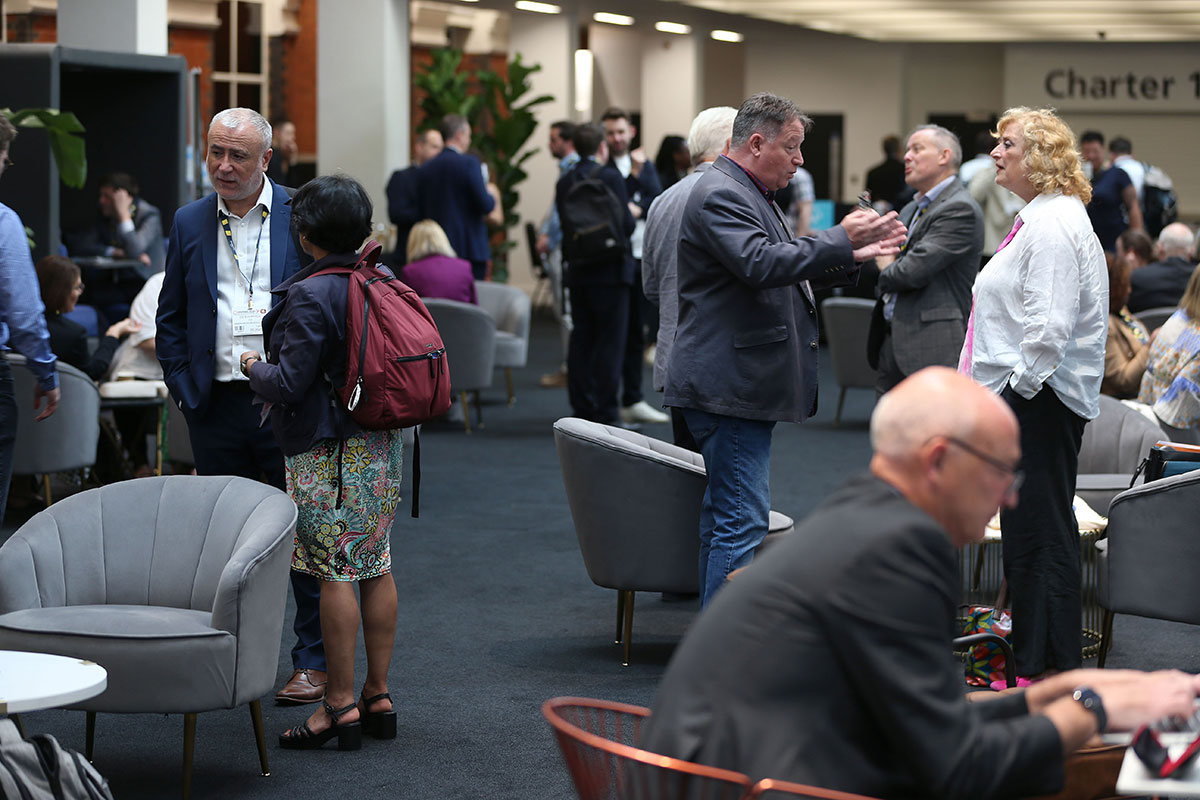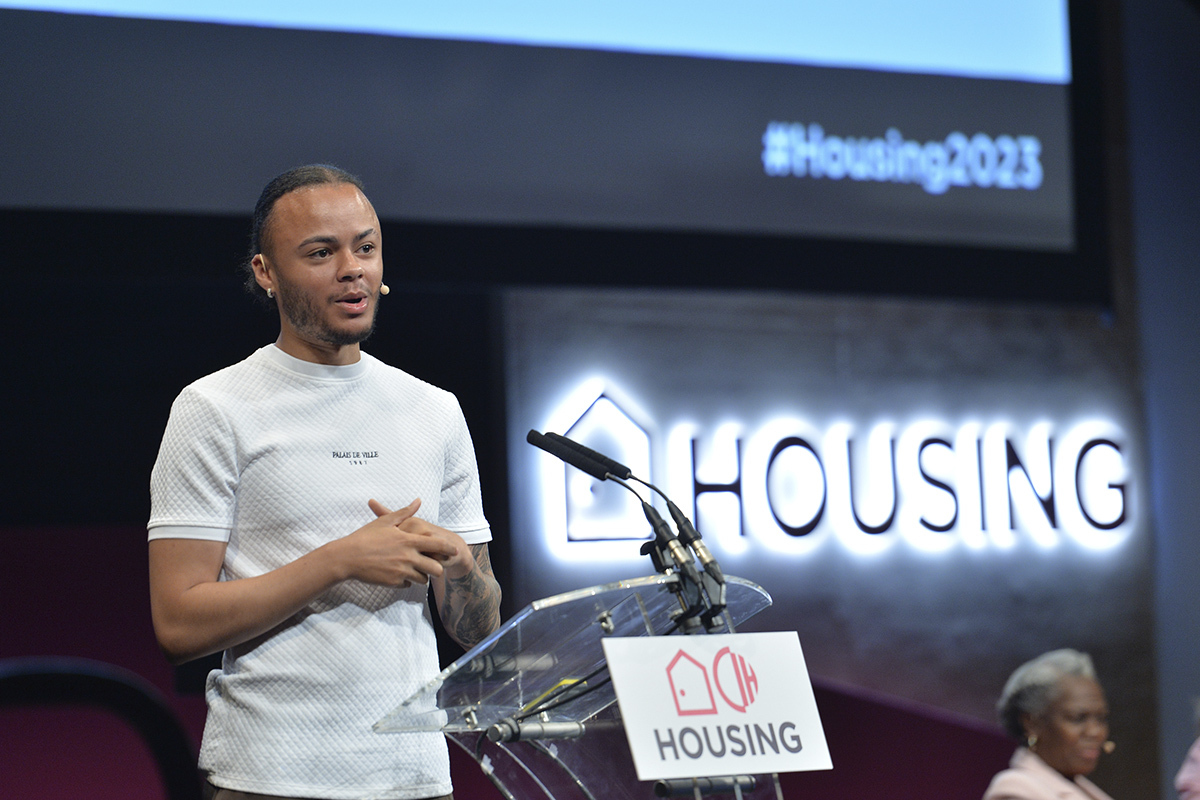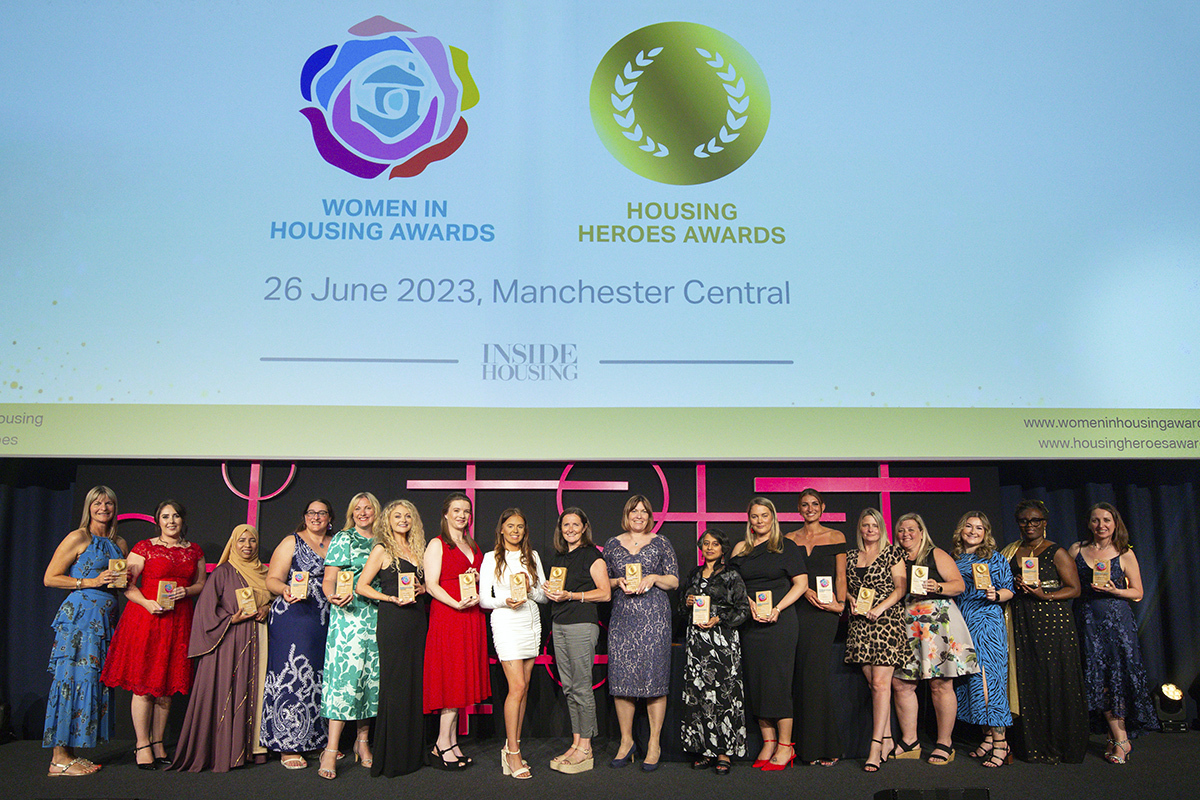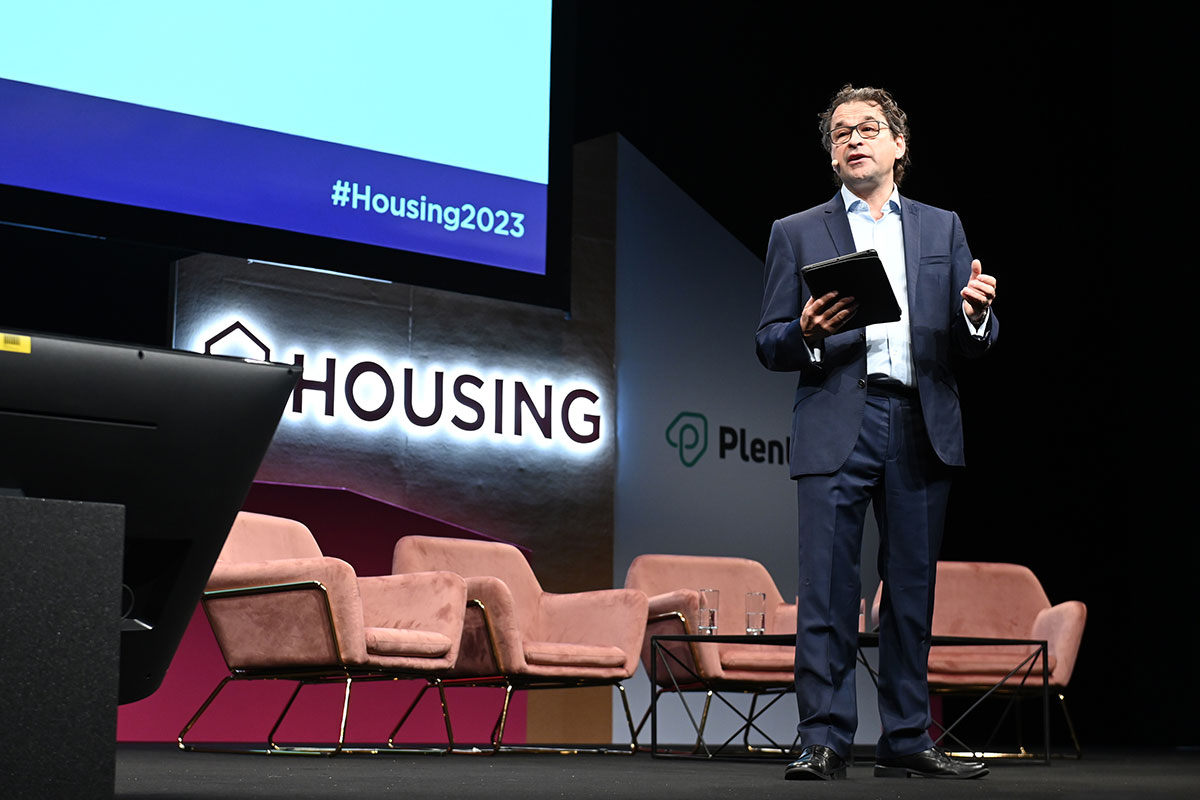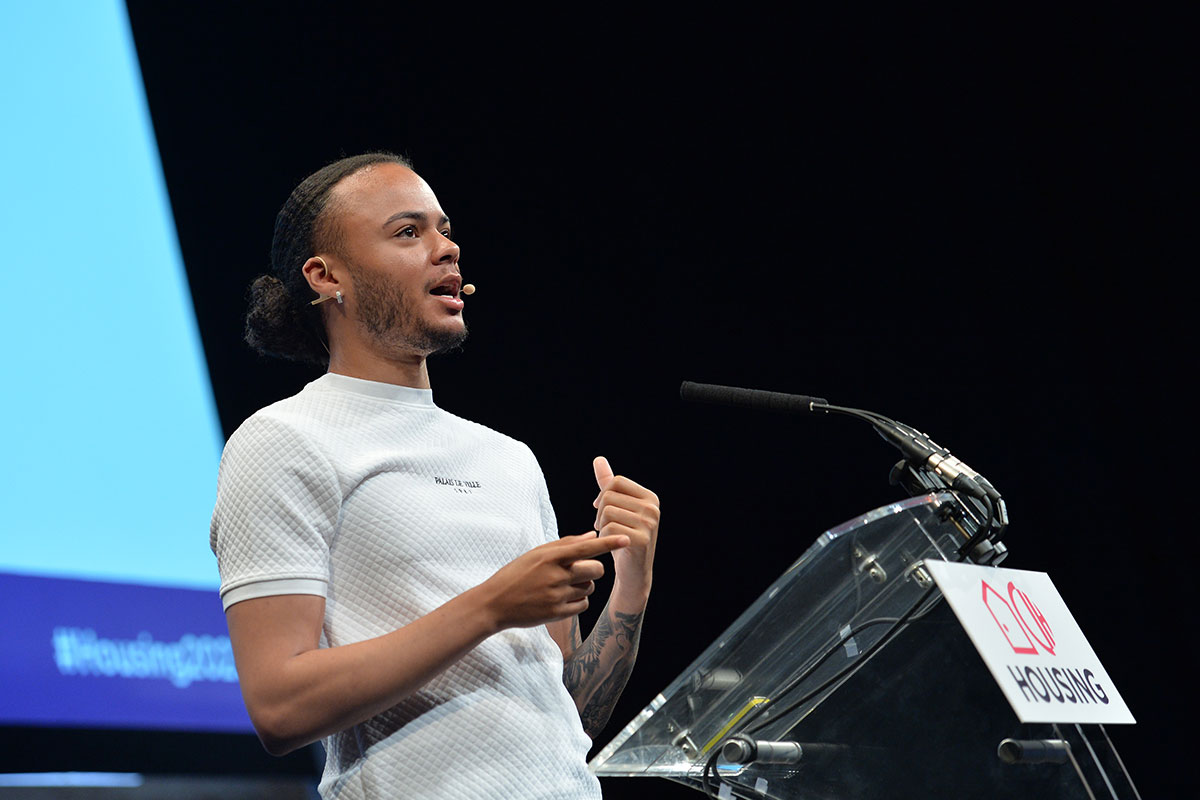You are viewing 1 of your 1 free articles
Dispatches from Housing 2023: day one
A daily round-up of the most important headlines from day one of the Housing 2023 conference. Photography by Guzelian
It’s that time of year again, folks. The housing sector has descended on Manchester for the Housing 2023 conference, and back to guide you through the highlights is your friendly neighbourhood Dispatches.
After three weeks of solid heatwave, delegates awoke to overcast skies and drizzly rain as they made the short trip from their hotels to the conference and exhibition centre – hopefully avoiding any trams.
Here is our round-up of what was discussed once they made it inside:
Smart technology
Gavin Smart, chief executive of the Chartered Institute of Housing (CIH), began his speech kicking off the conference on a sombre note.
“We are meeting at a pretty challenging time... perhaps the most challenging time for 30 years,” he said. “And that’s saying something, given we’ve recently come through both a global pandemic and the worst financial crisis for 100 years.”
Riffing through notes on an iPad, Mr Smart looked every bit the politician himself as he mused on the potential impact of a Labour government (“no suggestion of unexpected radical change” there, he said).
But he saved the most time to discuss the new challenge of mandatory qualifications for social housing managers.
Trying to inject some optimism, he said there was “more here to celebrate than to worry about”, but acknowledged it was “a reasonable criticism” to say they could restrict entry to the profession for people from excluded backgrounds.
He also addressed the shocking racial abuse on social media directed at Lara Oyedele, president of the CIH, following an interview with Housing Today in which she argued for increased diversity in the leadership of the sector.
Condemning the comments, Mr Smart told the crowd: “We stand four-square behind Lara as our president… and we never will accept the level of abuse that Lara was subject to,” to cheers and applause.
‘How to drown out Kwajo?’
How landlords can ensure their organisations are listening to tenants was one of the big topics of discussion in the main hall on day one of the event.
“I’m sorry for people coming here hoping for a new idea or thought,” Jenny Osbourne, chief executive of Tpas, began as she used her time on stage to bang the drum for improving the culture of an association from top to bottom.
“It’s important, because if we talk about things like improving engagement, organisations need to believe that, and it needs to be active, rather than just saying it,” she said.
Paying more than just lip service to residents’ concerns was a point also made by Kwajo Tweneboa (pictured above), the housing activist.
Mr Tweneboa has been successfully campaigning on behalf of residents living in disrepair for the past two years and has created a large platform on social media. His tweets of videos showing the appalling conditions residents face can cause media stories, and even get the attention of Michael Gove, the housing secretary.
He told delegates he was made aware of a recent meeting at one landlord that included a PR firm, which featured a slide that read: “How to drown out Kwajo?”
His point was that landlords can speak of cultural change, but their actual commitment to it might not be quite there yet.
Sticks and carrots
“There is a need for a stick and, at the moment, we don’t have the national legislative framework to apply it,” Eamonn Boylan, chief executive of the Greater Manchester Combined Authority, told Inside Housing this morning.
He said the authority’s power was “weaker than it needs to be. We need to be mandating people.”
In an ideal world, Mr Boylan said, the UN’s Sustainable Development Goals would be embedded into planning decisions, but “our planning system is designed to protect the interests of the landowner, and very little else”.
Matthew Bennett, ex-deputy leader of Lambeth Council turned social housing consultant, said Lambeth declared a climate emergency during his time there, and it “got more plaudits for that than any of the work that had been done on anything else”.
“But it was a statement… in itself it didn't achieve anything,” he said. Getting people involved in real action can prove somewhat harder.
Meanwhile, at a discussion of lawyers and bankers on decarbonisation funding, there was also a lot of stick-and-carrot metaphors, with Lloyds’ head of housing sustainability Chris Yau warning that soon all funding will demand clear ESG strategy and reporting.
Tackling LGBT+ stigma
It may be Pride Month, but there is a long way to go for social landlords to build trust with LGBT residents, say tenant representatives from customer voice organisation Rainbow Roofs.
Members of the panel drew attention to the higher levels of homelessness in the LGBT+ community, the harassment faced by LGBT+ residents in social housing, and the experience of LGBT+ asylum seekers, which means providers need LGBT-specific policies.
But providers should make sure not to “overpromise and underdeliver” said Judith McDermott, as that will only further damage trust.
What’s key, said Ged Mcloughlin, is that LGBT residents are represented in engagement strategy and supported by LGBT staff, to co-design policy to address harassment and stigma.
Better Social Housing?
“We've been put on notice – by the regulator, by [government] – to get our act together,” said Susmita Sen, corporate director of housing at the London Borough of Croydon, at a panel on the implications of the Better Social Housing Review.
Startling photos of a mould-infested home where a water leak went undiagnosed for four years flashed across the screen above, as Ms Sen highlighted Croydon itself as an example of “what happens if you do not remember what your core business is actually about”.
Ibby Ismail, board member at Mosscare St Vincent’s, said one quotation from page 4 of the review was telling: “there is nothing revelatory in our findings”.
That should give the sector pause for thought, he said. “Have we moved so far back that progress is actually just moving to standstill?”
“I suspect we all got a bit focused on development”, said Ian McDermott, chief executive of Peabody. “We focused on things other than core service.”
He mentioned the horrific story of Sheila Seleoane, a 58-year-old medical secretary who lay dead at her Peabody home for years as the landlord continued to collect rent.
“It was shameful, but it’s happened subsequently and it’s happened in smaller associations… the presumption that was all about us being big and impersonal was wrong,” he said.
Tomorrow the conference will hear from speakers including shadow housing secretary Lisa Nandy, the Regulator of Social Housing and housing ombudsman Richard Blakeway. Look out for our dispatch with all the key details.
Sign up for our daily newsletter
Already have an account? Click here to manage your newsletters
